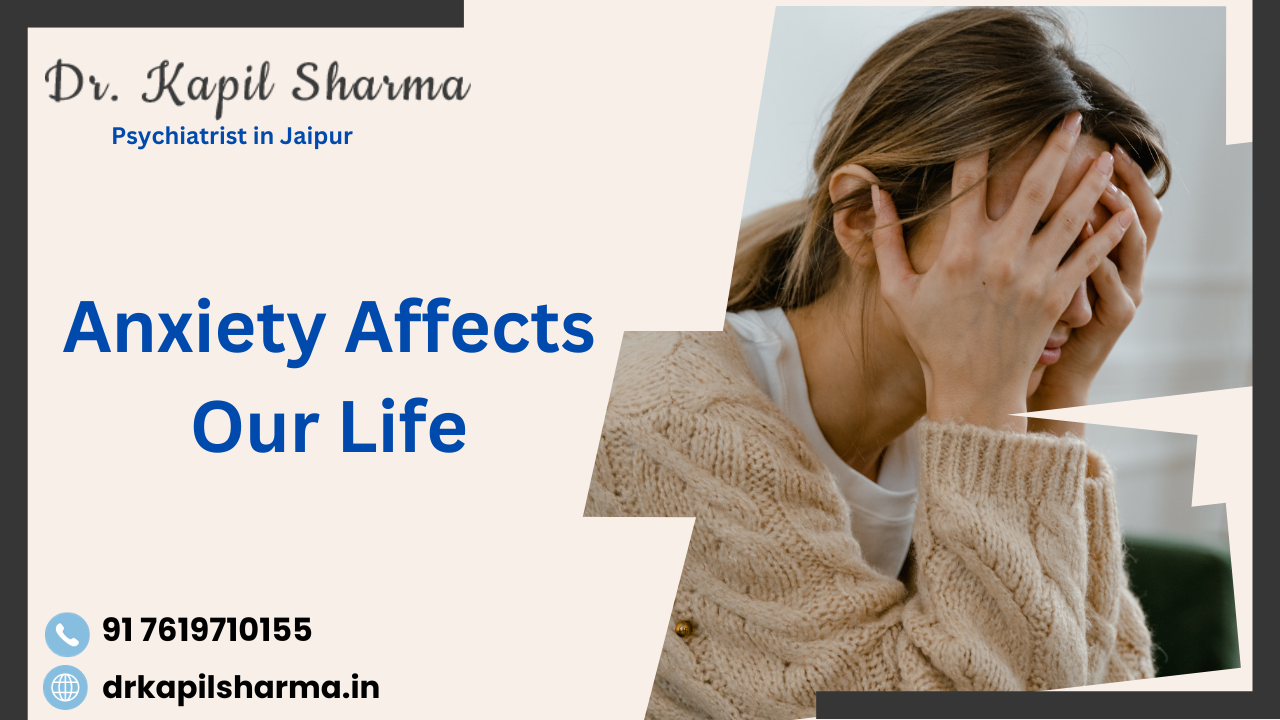
15 Ways That Anxiety Affects Our Life
Anxiety is a complex and pervasive mental health condition that can have a profound impact on various aspects of our lives. From our emotional well-being to our physical health, anxiety can manifest in numerous ways, often influencing our daily experiences and interactions. Understanding the diverse ways in which anxiety affects our lives is crucial for developing empathy, seeking support, and implementing coping strategies. In this article, we will explore 15 ways that anxiety can impact our lives and offer insights into managing and overcoming these challenges, with an emphasis on seeking professional help from a Best Psychiatrist Doctor in Jaipur.
- Emotional Turmoil: Anxiety often leads to intense emotional turmoil, including feelings of fear, worry, and unease. These emotions can be overwhelming and may interfere with our ability to enjoy life’s positive moments.
- Disrupted Sleep Patterns: Anxiety commonly disrupts sleep, causing difficulties falling asleep or staying asleep. This can lead to fatigue, irritability, and a decreased ability to cope with stress. Consulting a psychiatrist in Jaipur can aid in identifying the root causes of sleep disturbances and developing personalized strategies for better sleep hygiene.
- Impaired Concentration: The constant worry and racing thoughts associated with anxiety can make it challenging to concentrate on tasks. This can affect academic or work performance and hinder daily productivity.
- Social Withdrawal: Anxiety may contribute to social withdrawal as individuals may fear judgment or experience feelings of inadequacy in social situations. This isolation can exacerbate feelings of loneliness and worsen the overall impact on mental health.
- Physical Symptoms: Anxiety doesn’t just affect the mind; it can also manifest in physical symptoms such as muscle tension, headaches, and digestive issues. Chronic anxiety may contribute to long-term health problems if left unaddressed.
- Impact on Relationships: Anxiety can strain relationships by causing individuals to become overly dependent on others for reassurance or by creating communication challenges. Understanding and support from loved ones are crucial for navigating these challenges.
- Procrastination: The fear of failure or the pressure to meet high expectations can lead to procrastination. Anxiety may make it difficult for individuals to initiate tasks, contributing to a cycle of stress and avoidance.
- Perfectionism: Anxiety is often linked to perfectionism, where individuals feel an intense need to achieve unrealistic standards. This can result in chronic stress, burnout, and a diminished sense of accomplishment.
- Negative Self-Talk: Anxiety tends to amplify negative self-talk, fostering a critical inner dialogue. This can erode self-esteem and confidence, making it challenging to pursue goals and embrace opportunities. Working with a De-Addiction Centre in Jaipur can involve cognitive-behavioral interventions to reframe negative thoughts and promote positive self-talk.
- Impact on Career: Anxiety can influence career choices and advancement. Fear of failure or social anxiety may hinder networking opportunities, job interviews, or public speaking engagements, limiting professional growth.
- Unhealthy Coping Mechanisms: In an attempt to alleviate anxiety, some individuals turn to unhealthy coping mechanisms such as substance abuse or overeating. These behaviors can provide temporary relief but exacerbate the underlying issues over time.
- Financial Stress: The uncertainties and worries associated with anxiety can spill over into financial aspects of life. Managing finances may become a source of stress, affecting budgeting, spending habits, and long-term financial planning. Working with a Top Psychiatrist doctor in Jaipur can involve exploring the connections between anxiety and financial stress and developing coping mechanisms to navigate these challenges.
- Impact on Physical Health: Chronic anxiety has been linked to various health problems, including cardiovascular issues and a weakened immune system. It’s essential to address anxiety not only for mental well-being but also for overall physical health.
- Avoidance Behavior: Anxiety can lead to avoidance behaviors, where individuals steer clear of situations that trigger anxious feelings. This can limit personal growth and prevent individuals from facing and overcoming their fears. A best neuropsychiatrist in jaipur can provide guidance on gradually confronting and overcoming avoidance behaviors through exposure therapy and other therapeutic approaches.
- Interference with Decision-Making: Anxiety can cloud judgment and hinder decision-making abilities. The fear of making the wrong choice may paralyze individuals, preventing them from taking necessary steps forward in their personal and professional lives.
Conclusion: Recognizing the multifaceted impact of anxiety is the first step towards effective management and support. Seeking professional help, practicing self-care, and fostering understanding within communities can contribute to creating a more compassionate and resilient society for individuals navigating the challenges of anxiety.

